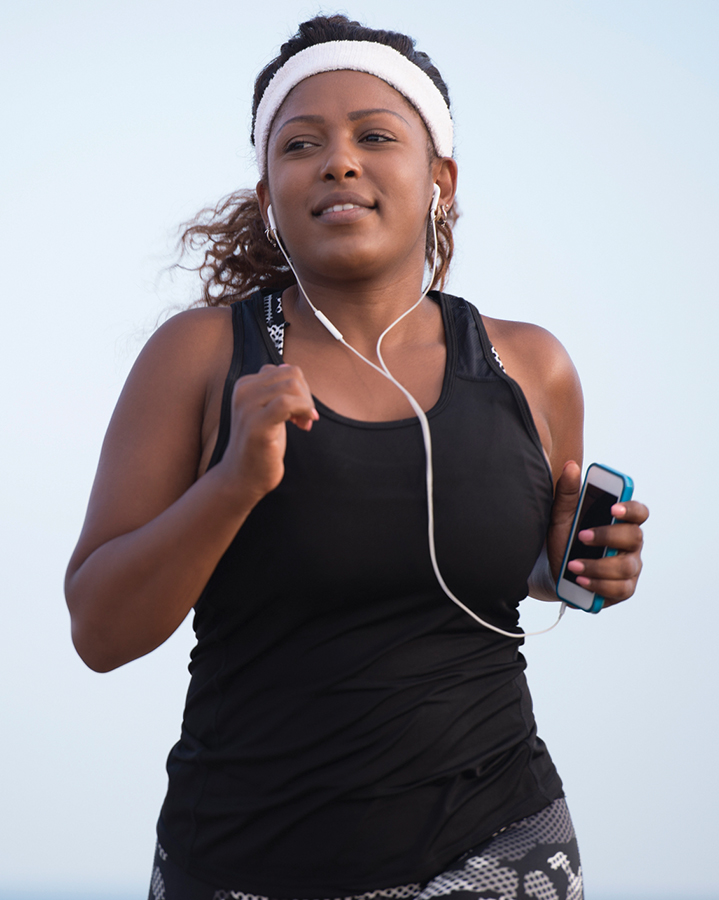There are a number of things that people can do to improve their health, but in general, people will benefit from making these five lifestyle changes:
- Give up smoking – smoking is a known risk factor for many respiratory infections, can increase the severity of respiratory diseases and is also a known risk factor for developing a severe disease from many respiratory infections.1
- Exercise more – adults should aim for 150 mins of moderate intensity exercise per week plus strengthening exercises twice per week.2
- Maintain a healthy BMI – being very obese increases the risks associated with COVID-19, putting the person in the moderate risk category.3
- Eat a healthy diet – following the Eatwell Guide is a great way to make sure that you are getting a healthy, balanced diet. Additionally, between October and March, it is recommended that adults and children over four years should take a daily 10 mcg supplement of vitamin D.4
- Drink less alcohol – no more than 14 units a week, spread over a number of days.5

Making every contact count
In 2018, over 88,000 people in the UK died from a condition that could have been prevented by a lifestyle intervention.6 If people are encouraged to make lifestyle changes, this could have a significant impact on the overall health of the nation and on the NHS.
Making Every Contact Count (MECC) is an initiative that encourages people, who have contact with members of the public, to seek opportunities to have lifestyle conversations. You will have hundreds of opportunities each week to talk to customers about their lifestyle and, as you have healthcare knowledge, you may even be able to support them to make changes.
MECC is not necessarily about giving advice. It is about asking open questions, listening and responding to someone in a person-centred way to give you a better understanding about the type of support they may need.
The below framework outlines how this can be used in conversations:
 COM-B model7
COM-B model7
Most lifestyle changes involve changing a behaviour and this can be challenging. Research shows that three elements are needed to generate a behaviour change: capability, opportunity and motivation. This is known as the COM-B model. Changing behaviour can increase capability, motivation and opportunity, creating an ongoing cycle of change.
Capability is having the mental and physical capacity to change a behaviour and includes having the necessary knowledge and skills.
Opportunity represents all the factors that lie outside the individual that make behaviour change possible or prompt it.
Motivation is about more than setting goals and conscious decision making; it is the brain process that energises and directs behaviour change.
Scenario: Using COM-B in practice
Priyah tells you she wants to improve her diet; she has put on some weight and wants to get it under control before her brother’s wedding in a few months. This suggests she is motivated to make a behaviour change for at least the short-term. However, before she can achieve this, she also needs the capability and opportunity. Consider the following:
- Does Priyah understand what a healthy diet is? How can you support her to get this knowledge if she doesn’t already have it? This is supporting her capability
- Does Priyah do her own food shopping and cook her own meals? How can you support her to create opportunities to control what she eats?
Using open questions, you can help Priyah understand what she needs to do to change her diet and then support her to plan some actions. You could end the conversation by encouraging Priyah to return and let you know how she is getting on. This builds loyalty but also provides more opportunities to support her.
Resources
It is important that any resources you signpost customers to are relevant, accurate and up to date. Here are some national websites that may be useful:
The NHS website – information on health services, managing or preventing health conditions, as well as making the best choices about health and wellbeing.
One You – free tips, tools and support on key lifestyle topics to support people to make healthier choices.
Every Mind Matters – expert advice and practical tips to help people look after their mental health and wellbeing.
Good Thinking – a range of NHS-approved tools and resources to help improve sleep and tackle stress and anxiety.
What additional resources do you have in your store? Do they meet the needs of your customers?
1. https://www.who.int/news-room/commentaries/detail/smoking-and-covid-19
2. https://www.nhs.uk/live-well/exercise/
4. https://www.nhs.uk/conditions/vitamins-and-minerals/vitamin-d/
5. https://www.nhs.uk/conditions/alcohol-misuse/
7. https://www.ncbi.nlm.nih.gov/pmc/articles/PMC3096582/
References last accessed December 2020.
